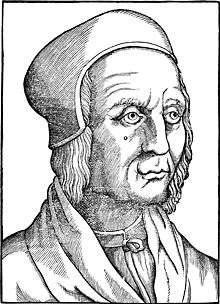Filippo Decio
Filippo Decio or Decius (1454 – c. 1535) was an Italian jurist whose services were courted by European universities and rulers. He was an influential representative of the pre-Humanist scholastic ius commune tradition.
Filippo Decio | |
|---|---|
 Woodcut of Filippo Decio from Pauli Iovii Novocomensis episcopi Nucerini Vitae illustrium virorum: tomis duobus comprehensae, & proprijs imaginibus illustratae by Paolo Giovio | |
| Born | 1454 |
| Died | 13 October 1535 |
| Nationality | Milanese |
| Other names | Philippus Decius |
| Occupation | jurist |
Life
Born into a Milanese noble family, Decio studied the humaniora and then law in Pavia under his brother Lancelotto and Jason de Mayno. In 1475, he attained a doctorate at Pisa, where he taught civil and canon law until 1502, except for a 1484–87 stint in Siena. After squabbles within the Pisan faculty, he taught canon law in Padua from 1502; his salary was 600 gold ducats. In 1505 the French king Louis XII, who was in Milan, requested that he move to Pavia; the initial objections of the Republic of Venice were overcome, and he moved there at the end of the year. By 1511 his salary had risen to 2000 florins.[1] Following departure of the French from Milan in April 1512 and the destruction of his home, his library and his manuscripts by the Swiss army, he followed Louis XII's call to Valence and became a member of the Grenoble parlement. In 1516, the Duke of Tuscany succeeded in convincing Decio to return to Pisa, and in 1528 he moved to Siena.
According to Mariano Sozzini, he died in Siena on 13 October 1535.[1] He is buried in the Camposanto Monumentale of Pisa, beneath a monument he himself commissioned before his death.
Publications
Celebrated in his time as a teacher and jurist, Decio was the most prominent and among the most prolific of the last generation of commentators following in the tradition of Cinus, Bartolus and Baldus. His commentary of 1521 on the De regulis iuris of the Digests, begun at Valence and completed at Pisa, sets out the methodological principles and criteria for a systematic approach to the study of law.[1] His published works include:
- Apologia sacri Pisani Concilii moderni (auctore Ph. Decio). Pisis: per Palladium Bellonem Decium, sacri Pisani Concilii moderni calcographum, [1511]
- Philippi Decii ... Lectura super titulo de regulis iuris ff. edita in florentissima universitate Valentiae ubi tunc residebat & legebat cu[m] summo apparatu & maximo scolasticor[um] co[n]cursu .... Venetiis: impressa a Philippo Pincio, 1521 die 16 Januarij
- Commentaria in primam Digesti veteris partem: necnon in alias partes civiles ... Venetiis: De Tortis, 1523
- In Digestum vetus et Codicem commentaria (in Latin). Venice: Giovanni Battista Somasco & fratelli. 1570.
 In Digestum vetus et Codicem commentaria, 1570
In Digestum vetus et Codicem commentaria, 1570
References
- Aldo Mazzacane (1987). Decio, Filippo. Dizionario Biografico degli Italiani, Volume 33. (in Italian) Accessed May 2013.
- Holthöfer, Ernst (2001). "Decio, Filippo". In Michael Stolleis (ed.). Juristen: ein biographisches Lexikon; von der Antike bis zum 20. Jahrhundert (in German) (2nd ed.). München: Beck. pp. 171–173. ISBN 3-406-45957-9.